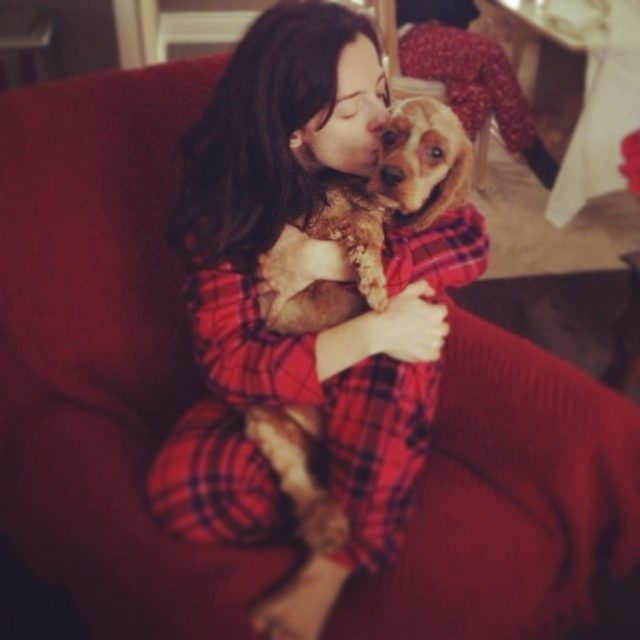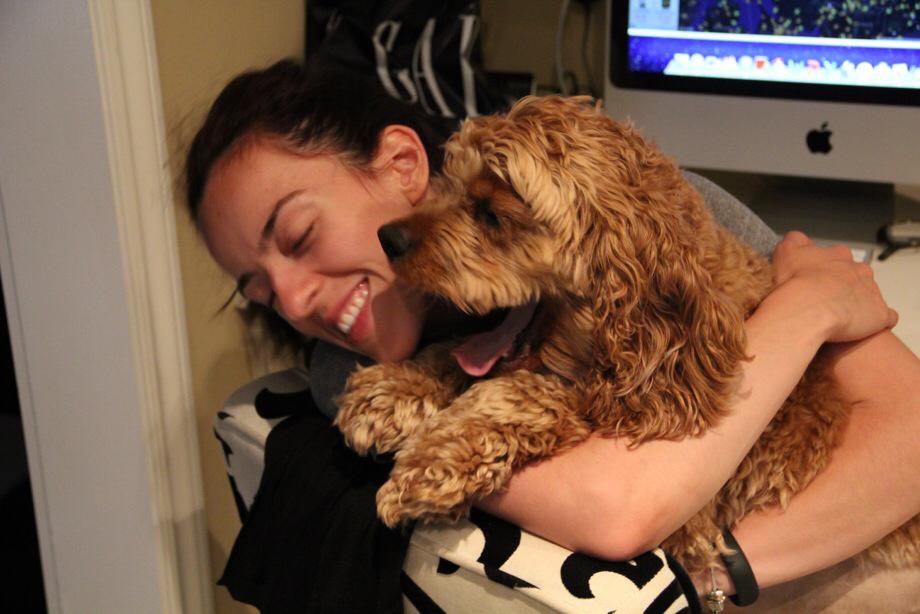‘For many, losing a pet feels exactly the same as losing a loved one, a family member’
Like every night, Yogi is trying to lie on the red couch placing slowly one paw after another, keeping his eyes on Veronika Zotochkina while he is doing it.
He knows she doesn’t want him to be on the couch, but he will still give it a try.
Hoping to get her attention, he finally sits on it doing his usual trick, raising his legs up and showing his puffy paws. With round brown eyes, a curly hair of a coppery yellow, and drool dripping down his face, Yogi, begins to moan.
That’s Zotochkina’s most vivid memory of him. Yogi, was an three-year-old American cocker spaniel, who passed away five years ago after a fatal diagnosis of liver disease.
“He was very, very sweet, extremely attuned to my emotions, super curious, always testing your rules,” Zotochkina says. “For example, if you don’t want him to be on the couch, sometimes he would see that you are in the good mood while sitting and will try to jump on there.”
Zotochkina, 29, born and raised in Russia, is a former clerk at George Brown College’s student affairs department and is now a projects co-ordinator at Barbra Schlifer Commemorative Clinic in Toronto, an organization which assists women who are fleeing violence.
She has been living in Canada on her own for the last couple of years. Yogi, was his only family here.
Usually, for pet owners, the death of their companion is not the pure loss of an animal, but it is a painful goodbye to a loyal and unique friend who gave unconditional love.
Today, in “modern” society, full of loneliness and solitude, pets have become part of the family, even replacing a lack of partners or family members for people. In the event of the loss of a pet, the mourning process can be tougher for pet owners whose pets are their only companion.
“I was depressed in bed for about three months, actually not moving much because the heartbreak was worse than I have ever experienced,” says Zotochkina. “The entire year every conversation about him would bring tears to my eyes. To this day it does, and it has been five years since he passed away.”

Veronika Zotochkina and Yogi
Joseph Fabian, an assistant manager at Mulberry Inc., agrees; he came to Toronto from the Philippines a couple of years ago. He has two golden retrievers, Jojo, and Chucks. Thinking about the day they would die brings tears to his eyes.
“The thing is that is so hard when you get attached to the dog you have,” says Fabian, “is like either you want to have the same one or a new one, or don’t have a dog anymore, you know what I mean?”
When facing the loss of a pet, it’s particularly challenging to deal with the empty space, and immigrants like Zotochkina and Fabian can endure a more painful path in the process of mourning, not having anyone else.
According to a study by Dr. Julie Axelrod Austin, a clinical psychologist from Mill Valley, California, when it comes to a pet that suddenly dies, people with no pets tend to show insensitivity and can’t really understand the depth of grief for pet owners.
“Mourning a pet may not only be painful because of the loss itself but deeper due to the potential loneliness of this type of grieving,” says Austin.
To Austin, when pet owners deal with the loss of a pet, they are dealing with “several mourning losses” at the same time such as the loss of unconditional love, of a dependant, of a life witness, of multiple relationships and routines, and in most cases, the loss of a main companion.
Austin says the mourning process can be tough because pet owners feel responsible for another life, and they always make sure to provide physical and emotional well-being to their pets.
“We hire pet walkers and sitters to provide our furry friend with company or exercise. We go to dog parks to enhance our pooch’s life with social activity,” says Austin.
“All are efforts to provide our charge with the best care-taking possible. Consequently, the loss of a pet can feel like the loss of a child,” adds Austin.
Zotochkina agrees, “for many, losing a pet feels exactly the same as losing a loved one, a family member,” she says.
Dr. Austin explains that the grieving loss is more profound when pet owners relied exclusively on pets for support and love.
“For some of us, our pet was our only social companion in the world. We may not have had any other close contacts, due perhaps to depression, anxiety, or a debilitating physical illness,” says Austin.
The grieving becomes unbearable when the pet owner has to deal with the loss of his primary companion; for Zotochkina, this was the most complicated issue when mourning Yogi.
“I have many special memories with him, one happened on a day I was feeling very homesick and was lying in bed while crying,” says Zotochkina. “He ran up the bed, and though he was normally very hyper and cheery, he was very calm and just lay close to my face and licked my tears away.”
According to The Canadian Animal Health Institute, pet ownership in the country has increased from seven million cats and 6.4 million dogs in 2014 to 8.8 million cats and 7.6 million dogs in 2016. On average, in Canada, about 41 per cent of houses have a dog, and 37 per cent have a cat.
To John Archer, a professor in the department of psychology at the University of Central Lancashire, the explanation is simpler, “at the heart of the relationship with pets is a unique affectionate bond. Quite simply, people love their pets.”
“Pets greet their human companions enthusiastically on the worst days, they do not notice bad hair, they forgive mistakes, and they do not need to talk things through,” says Archer.
“This perception of the pet as family translates into “parental” behaviour for many pet owners. Seven out of 10 pet owners allow their pets to sleep on their beds, and six out of 10 have their pet’s pictures in their wallets or on display with other family photos,” says a study by Ipsos Reid. “Almost all pet owners (98%) admit to talking to their pets.”
That’s precisely what made Zotochkina fall in love with Yogi.
“Pets teach you so many things, kindness, taking care of someone, the simple and pure joy of little moments,” says Zotochkina. “Unconditional love regardless of your mood, they are always happy to see you and always love you.”
For Zotochkina, as for 83 per cent of urban pet owners in Canada, according to Ipsos Reid numbers, animals are considered to be members of the family, and for her, and for many that rely on pets as their only companion, mourning the loss of Yogi was tougher because she was by herself.
In spite of that, just like with any loss, only time truly helps with grieving.
“What I personally found comfort in, is the fact that I know that I tried to give him the best life which he deserved,” says Zotochkina. “I was just fortunate to own the best puppy in the world, and I am glad that he chose me to be his owner.”


